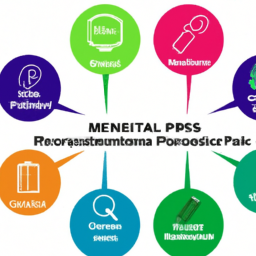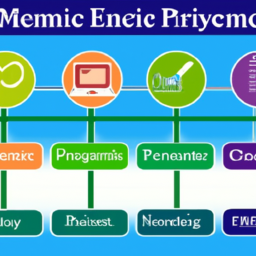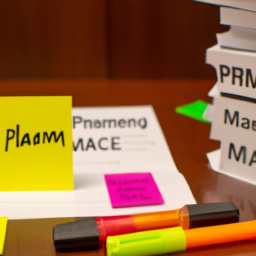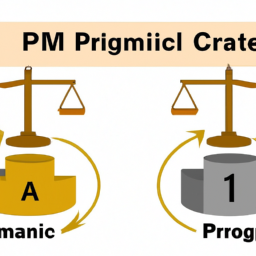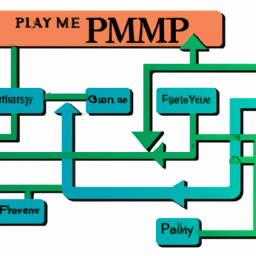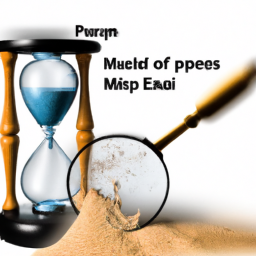Are you struggling to create a study plan that will help you pass the PMP exam? Look no further! In this article, we will show you how to create a winning study plan that will set you up for success.
By following our step-by-step guide, you will learn the benefits of having a study plan, how to assess your current knowledge and skills, set realistic study goals, design an effective study schedule, and implement active learning strategies.
Get ready to ace the PMP exam with our expert tips!
Key Takeaways
- A study plan helps with organization, focus, retention, and time management during PMP exam preparation.
- Assessing current knowledge and skills through self-assessment and gap analysis helps identify strengths and weaknesses for targeted study efforts.
- Setting realistic study goals and breaking them down into smaller tasks helps create a manageable study schedule and provides motivation for completion.
- Implementing active learning strategies such as problem-solving, teaching others, using visual aids, taking breaks, and regular reflection and review enhances the effectiveness of the study plan.
Benefits of Having a Study Plan
Having a study plan helps you stay organized and focused on your PMP exam preparation. It is crucial to have a structured approach to your studying in order to maximize your chances of success.
One key benefit of having a study plan is that it improves retention of the material. By organizing your study sessions and breaking down the content into manageable chunks, you are more likely to remember and understand the information.
Additionally, a study plan allows you to incorporate effective time management techniques. By allocating specific time slots for studying and sticking to a schedule, you are able to make the most of your available time and avoid procrastination.
This ensures that you cover all the necessary topics and have ample time for revision before the exam.
Assessing Your Current Knowledge and Skills
Take a moment to evaluate your current knowledge and skills in order to determine the areas that require further improvement. Conducting a self-assessment and performing a gap analysis is crucial when preparing for the PMP exam. This will help you identify your strengths and weaknesses, allowing you to focus your study efforts on the areas that need the most attention. To make the process easier, consider using a table like the one below:
| Knowledge/Skill Area | Strengths | Areas for Improvement |
|---|---|---|
| Project Integration Management | Excellent understanding of processes and tools | Need to improve on developing project charters |
| Project Scope Management | Solid grasp of requirements gathering techniques | Struggle with defining project scope |
Setting Realistic Study Goals
To stay on track and make the most of your study time, it’s important to set realistic goals for yourself. Here are some tips to help you with time management and motivation techniques:
-
Break down your study goals into smaller, manageable tasks. This will make them less overwhelming and easier to tackle.
-
Create a study schedule that fits your lifestyle and commitments. Set specific time slots for studying and stick to them.
-
Use a planner or a study app to track your progress and stay organized.
-
Find motivation by rewarding yourself after completing a task or reaching a milestone in your study plan.
-
Surround yourself with a positive and supportive study environment to stay motivated and focused.
Designing an Effective Study Schedule
Design an effective study schedule that fits your lifestyle and commitments by breaking down your goals into smaller, manageable tasks. Time management is crucial when preparing for the PMP exam, and having a well-structured study schedule will help you stay organized and focused. To assist you in creating your study plan, consider the following table:
| Time Slot | Study Task |
|---|---|
| Weekday morning | Read and summarize a chapter |
| Weekday afternoon | Review flashcards and practice questions |
| Weekday evening | Watch instructional videos |
| Weekend morning | Take a full-length practice exam |
| Weekend afternoon | Review and analyze results |
Implementing Active Learning Strategies
Now that you have your well-structured study schedule in place, it’s time to actively engage with the material and implement strategies that enhance your learning experience. Here are five active learning techniques to make your study plan even more effective:
-
Practice problem-solving: Solving real-world problems related to the content you’re studying helps you apply your knowledge and solidify your understanding.
-
Teach someone else: Explaining concepts to someone else not only reinforces your understanding but also helps you identify any gaps in your knowledge.
-
Use visual aids: Visual representations, such as diagrams or mind maps, can help you better understand complex information and improve your memory retention.
-
Take breaks: Regular breaks during study sessions can help prevent burnout and keep your focus sharp.
-
Reflect and review: Take time to reflect on what you’ve learned and review your notes regularly to reinforce your understanding.
Frequently Asked Questions
How Can I Stay Motivated Throughout My PMP Exam Preparation?
To stay motivated throughout your PMP exam preparation, it’s crucial to maintain focus on your goals. Remind yourself of why you started this journey and envision the satisfaction of achieving your certification.
Break your study plan into manageable chunks, setting realistic daily and weekly goals. Celebrate small victories along the way to keep yourself motivated.
Stay disciplined and establish a routine that works for you. Remember, consistency and determination will lead you to success.
Are There Any Specific Study Materials or Resources That You Recommend for PMP Exam Preparation?
When it comes to PMP exam preparation, there are definitely some recommended study materials and online resources that can help you succeed.
From comprehensive study guides to interactive practice exams, these resources provide the necessary tools to enhance your understanding and retention of the material.
Online platforms like PMI’s official website and various PMP forums also offer valuable insights and discussions.
What Are Some Common Mistakes to Avoid When Creating a Study Plan for the PMP Exam?
When creating a study plan for the PMP exam, it’s important to avoid some common mistakes.
One mistake is not setting realistic goals and deadlines. Be sure to plan your study sessions in a way that aligns with your schedule and allows for breaks.
Another mistake is not diversifying your study materials. Use a variety of resources, such as books, practice exams, and online courses, to ensure you are getting a well-rounded understanding of the exam content.
How Can I Effectively Manage My Time While Studying for the PMP Exam?
To effectively manage your time while studying for the PMP exam, you need to employ time management techniques and effective study strategies.
Prioritize your study tasks based on their importance and difficulty level.
Break down your study sessions into smaller, manageable chunks to avoid burnout.
Create a schedule that includes dedicated study time and stick to it.
Eliminate distractions and focus solely on your studies during your dedicated study sessions.
Regularly assess your progress and make adjustments to your study plan as needed.
Are There Any Tips or Strategies for Overcoming Test Anxiety During the PMP Exam?
Feeling nervous about the PMP exam? Don’t worry, you’re not alone! Test anxiety can be overwhelming, but there are strategies to help you overcome it.
Start by managing your anxiety through relaxation techniques. Take deep breaths, visualize success, and practice positive self-talk.
Additionally, create a study plan that includes regular breaks and rewards to alleviate stress. Remember, you’ve prepared for this exam, and you’re capable of acing it!
Conclusion
Now that you’ve learned the importance of having a study plan and the steps to create one, it’s time to embark on your journey towards success.
Just like a skilled sailor navigating through rough seas, your study plan will guide you towards your destination – passing the PMP exam.
Remember, assess your knowledge, set realistic goals, design an effective schedule, and implement active learning strategies.
Stay focused, persevere through challenges, and let your study plan be your compass.
With dedication and determination, you will conquer the PMP exam and sail towards a brighter future.


